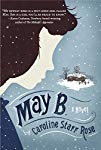Through the Looking Glass Children's Book Reviews
May B.
Poetry
For ages 8 to 12
Random House, 2014 ISBN: 978-0385374149
For many pioneers the open Kansas prairie is a bleak and inhospitable place, but for May, her brother Hiram, and her parents, it is home. They live in a sod house, but it is not uncomfortable, and they have their livestock and their land to provide for them. The only real thorn in May’s side is the fact that she cannot seem to make the words in books behave so that she can read them. Her old teacher was kind and understanding and she had faith that May would, one day soon, master reading. May’s new teacher has no patience, and worse still she assumes that May is “not fit for learning,” which is completely untrue. May can do sums in her head with ease and she remembers all manner of things. Reading is the only subject she struggles with.
May takes joy in the prairie and her life at home as best she can, but then one summer day her parents tell her that they are going to send her to a homestead fifteen miles to the west so that she can work for Mr. and Mrs. Oblinger. Mr. Oblinger’s new wife is from back east and she needs help around the house. May’s parents assure her that she will only have to stay until Christmas, but this does not make her feel any better. She dreads having to live with strangers so far away for so long. What makes things even worse is that her schooling will suffer while she is gone. How will she ever catch up? Pa explains that she will be “helping out,” but all May can think is that she will be “helping everyone / except myself.”
The Oblinger sod house is not as cozy as May’s home, and Mrs. Oblinger is not in the slightest bit welcoming. She tells May that she “hates this place,” and she makes no effort to care for her home or her husband. The atmosphere in the house is grim, and at night May hears the woman crying in the dark.
One day Mrs. Oblinger asks May to pack her some biscuits which May has baked. She plans on going for a ride on the prairie. Mr. Oblinger is pleased to see that his wife has roused herself, and that she is looking so happy, but his pleasure does not last long. Later in the day May finds a letter from Mrs. Oblinger in the house. In the letter the woman announces that she is going to get the train and go back to Ohio. She has had enough of prairie life.
Mr. Oblinger hitches the second horse to the wagon and heads for town, clearly hoping that he will get there before his wife has a chance to board a train going east. Now all alone, May cannot help worrying a little, but she convinces herself that Mr. Oblinger will be home soon.
Mr. Oblinger does not come home. Days roll into weeks, which fold into months. With no means of conveyance, and no sense of where she is or where the town lies, May feels that she has no choice but to stay where she is. Surely Mr. Oblinger will come home at some point.
This powerful novel in verse takes us back to a time and a place where life was very hard. It is difficult to imagine how May’s parents could send their child away in such a manner, but scraping a living from the prairie was not easy and they did what they felt they had to do. May’s struggles as she does her best to survive alone and in the middle of nowhere are painful, but during this time something good, something unexpected does happen.
Rich imagery and beautiful language combine in this story to bring readers a tale that they will think about long after the book is closed.




